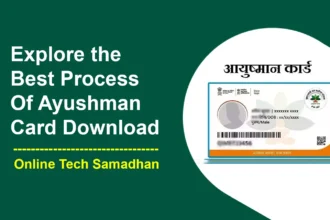From Phishing to Fake Deals: What to Do After an Online Scam?
Online frauds can leave you feeling puzzled and unsure of what to do next, much like a sudden storm. You’re not alone if you’ve been a victim of one. These scams frequently leave us feeling disoriented. But don’t panic, there are actions you can take to manage this difficult circumstance. It’s critical to remain cool and respond quickly. You may start taking back control further Action and protecting yourself from future scams like this by following a few easy but important actions. Let’s Explore What to Do After an Online Scam.

What is Online Scams?
Online scams are a serious harm in the current digital era, as they cause financial and psychological hardship for victims all over the world. These scams can take many different forms, such as investment fraud, phishing emails, phony websites, identity theft, romance scams, and more. Knowing how scammers operate is the first step to safeguarding yourself and acting appropriately if you’ve been conned.
You May Love To Read
- Top 14 Best Option Trading Telegram Channel 2024: Join Now!
- CSC EMI Collection: A Hassle-Free Way to Payment Loan EMI
- What to Do When Your Video Has been Blocked on Instagram: Tips and Solutions
- How to Pay Telegram Premium: To Upgrade Communication and Productivity
- Biggest Surprise on Vimeo Apk Explore Now!| Free Download
Recognizing Different Types of Online Scams

- Phishing Scams: Scammers impersonate legitimate entities to obtain sensitive information like passwords, OTP, credit card details, or personal information.
- Fake Websites: Fraudulent websites mimic authentic ones to lure individuals into making purchases or sharing personal information.
- Identity Theft: Criminals steal personal information to commit fraud, open accounts, or make unauthorized transactions.
- Romance Scams: Perpetrators create fake identities to form emotional connections and then request money from their victims.
- Investment Fraud: False promises of high returns lure individuals into investing in non-existent or fraudulent schemes.
- Romance Scams: Building fake online relationships to gain trust and eventually swindle money is a scammer’s favorite pastime. Be cautious of overly romantic advances from strangers, especially if they ask for financial help.
- Tech Support Scams: These calls or pop-ups claim to detect viruses on your computer and offer “urgent” tech support, often at a hefty price. Don’t fall for it! Contact your trusted techie friend or a reputable antivirus company instead.
- Survey Scams: Offering prizes or free rewards in exchange for completing surveys can lead to malware downloads or subscription scams. Be wary of unsolicited surveys, especially those requiring personal information.
- Job Scams: Fake job postings promising high salaries and minimal work can lure you into revealing personal information or even paying upfront fees. Research the company thoroughly before applying, and never pay for a job.
- Social Media Scams: Fake giveaways, hacked accounts, and sponsored content disguised as genuine recommendations can all be trapped. Be skeptical of anything that seems too good to be true, and be mindful of what you share on social media.

What to Do After an Online Scam: Step-by-Step Guide
Step 1: Immediate Actions After Falling Victim to a Scam
- Report to Authorities: Contact your bank or financial institution immediately to report unauthorized transactions and freeze your accounts if needed.
- Document Everything: Keep records of all communications, transaction details, emails, and any evidence related to the scam.
- Monitor Your Accounts: Regularly check your bank statements, credit reports, and online accounts for any suspicious activity.
- Notify Relevant Organizations: Inform credit bureaus, utility companies, and other relevant institutions if your personal information has been compromised.
- Complaint Authorities: File a complaint with the appropriate authorities like Cybercrime Helplines or local law enforcement.
Step 2: Understanding Your Rights and Legal Recourse
- Know Your Rights: Learn more about consumer protection laws and regulations, such as those provided by banking authorities or cybercrime divisions.
- Timeframe for Reporting: Many financial institutions have a limited window within which you must report fraudulent activity to limit liability.
- Seek Legal Assistance: If necessary, consider seeking legal advice or assistance to recover lost funds or pursue legal action against scammers.
Step 3: Actions for Recovery and Success
- Work With Your Bank: Cooperate with your bank’s fraud investigation team and provide them with all necessary details and evidence.
- Follow Up Regularly: Stay in touch with the bank about the unauthorized transaction and request a chargeback. If they have not taken any proper Action then you also complained to Cybercrime Helpline 1915. This is important because according to RBI rules, if you notify any unauthorized electronic transaction to your bank within 3 days, then your liability is zero.
- Complaint Banking Ombudsman or RBI: Raise an Online Complaint Banking Ombudsman or RBI if your bank fails to address your complaint adequately.
Protective Steps to Stay Secure from Online Scams

- Educate Yourself: Stay updated on prevalent scams by reading resources from trusted sources, government advisories, and online security blogs.
- Verify Sources: Be cautious with emails, links, or calls from unknown sources. Verify the authenticity of websites before sharing personal details.
- Use Secure Platforms: Conduct financial transactions only on secure websites with HTTPS encryption and avoid using public Wi-Fi for sensitive activities.
- Enable Two-Factor Authentication (2FA): Add an extra layer of security by enabling 2FA wherever possible, especially for banking and email accounts.
- Beware of Red Flags: Be wary of unsolicited offers, requests for personal information, and deals that seem too good to be true.
Conclusion
If you take quick action and preventive measures, you can reduce your risk of falling victim to an online scam. Remember that your best defenses against online risks are knowledge and awareness. By informing your friends and family what you’ve learned, you can build a safety net that keeps everyone secure online. We can all help to make the internet a safer place for everyone by taking quick action and raising awareness.
FAQs
What should I do immediately after falling victim to an online scam?
Can I recover my lost money after an online scam?
It’s possible. Quick reporting and following proper procedures increase the chances of recovery, but it’s not guaranteed.
How can I protect myself from future online scams?
Stay cautious. Verify sources, avoid sharing sensitive info, use secure payment methods, and keep updated about prevalent scams.
Why is it important to share information about online scams?
Sharing knowledge helps protect others. Alert friends and family about scams to create a safer online community for everyone.
What if I’ve shared personal information with scammers?
Immediately contact your bank and relevant authorities. Consider freezing accounts or changing passwords to prevent further misuse.
Should I trust emails or calls asking for personal information?
Be cautious. Legitimate entities rarely ask for sensitive details via unsolicited messages. Verify before sharing any information.
You May Love To Read
- AIIMS Online Appointment Ticket Booking Expert Guide 2024
- Disney+ vs HBO Max – Which is Better Disney or Max for You?
- Investment Options for Young Professionals in India with Limited Capital in 2024
- Paytm First Game APK Download Play Favorite Exciting Games!
- Exciting Android 15 New Features and Updates: Explore Now
How can I stay informed about new scams?
Stay updated with reputable sources like government advisories, security blogs, and official financial institutions’ announcements.























